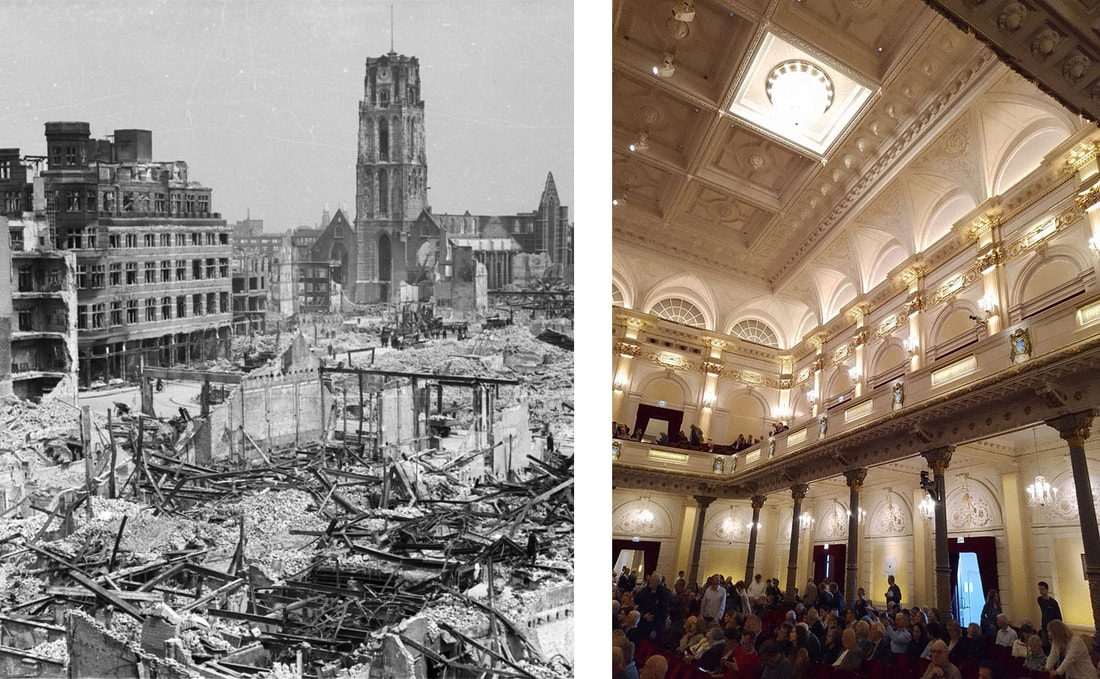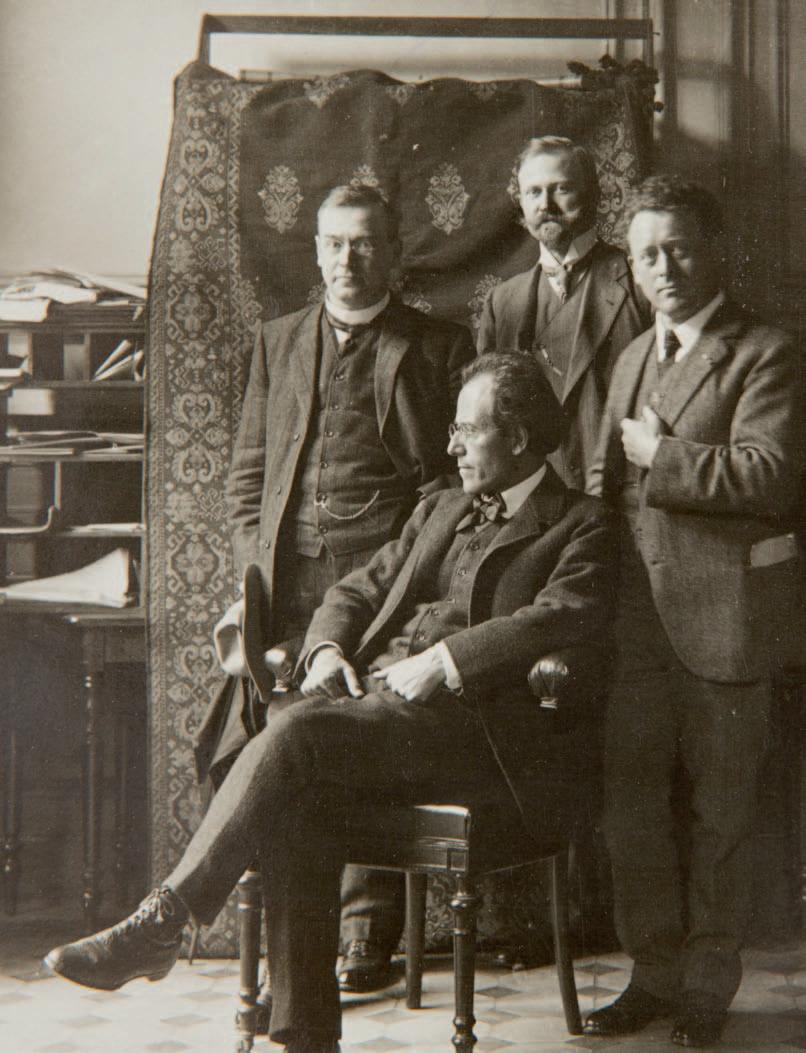To commemorate the bombing of Rotterdam (on 14 May 1940), the Rotterdam Philharmonic Orchestra is touring a number of places in the Netherlands with Gustav Mahler's 2nd symphony, visiting Amsterdam on 16 May, two days before Mahler's death anniversary. The city where Mahler himself conducted the Dutch premiere of this symphony in 1904. According to Stefan Zweig, art can make palpable what is crushed between the millstones of history. With the Rotterdam Philharmonic Orchestra's performance, conducted by Lahav Shani, of Mahler's mighty second symphony, art seemed to aim to make sense of both the millstone and the crumbs. In a very confident reading, Shani led the Rotterdam orchestra along a journey of extreme moods: a traverse through deep valleys and euphoric heights. In what is perhaps the most operatic symphony in the repertoire, Shani opted for relatively slow tempi for the theatre of the second symphony (this was not a performance that would fit on one CD). Tempi with which he electrified moments and maximised expectations and which showed great insight into the architecture of the piece. On rare occasions, such as towards the end of the first movement, the slow tempi seemed to stall the journey, seemed to rob the music of its forward moving power, but that comment may be taken as splitting hairs in the context of this majestic performance. Mahler's Second is a symphony with strong contrasts between the movements, and in a good performance these contrasts complement each other, recognise in each other's differentness a kindred spirit. Mahler originally wrote a programme for his symphony but later omitted it. Within the context of this performance, the commemoration of the destruction of a city, and this symphony's nickname, Resurrection, music as ultra-powerful to the imagination as this one does not need a programme anyway. Little can match the hallucinatory powers of the brain as it searches for the personal images and feelings that the cathedral sounds of the Mahlerian orchestra evoke in it. At the crossroads where music and listener meet, a theatre of the mind is erected that no programme can do justice to. Despite the vast resources deployed, a large orchestra plus choir and solo singers, it is art that ultimately reveals itself to the listener in an extremely personal and intimate way. In Mahler's ingenious orchestration, in the details of the instrumental parts, the symphony is like a landscape in which the story of a life unfolds. Inseparable from life is death - the knowledge that time is limited is omnipresent in Mahler - and in his Second Symphony, Mahler sets himself nothing less than the goal of conquering death. The thundering percussion and raging strings created an irresistibly demonic atmosphere, with melodies cutting through the air like razor-sharp riffs. It was like a desperate opera of redemption. With those ambitions and pretensions in mind, it can be called remarkable that the text and music Mahler deploys speak to the listener in such a poignant way. Grand gestures that connect with intimate feelings, we love it at Wagner & Heavy Metal where we don't shy away from that irresistible mix of bombast and vulnerability. The form determines the content, the lyrics in the last two movements are a kind of religious tearjerker, but by piling up what would be clichés in the hands of lesser composers, Mahler, without falling into flat sentiment, rigs up an edifice that inspires awe and moves profoundly. It is up to performers to do justice to that brew of contradictions in a non-conflicting way, to leave nothing underexposed. The Rotterdam Philharmonic Orchestra and its conductor masterfully fulfilled that task. Everything fell exactly into place. Everything remained defined and audible. An orchestra that does not have its home base in the Concertgebouw might fall into the trap of playing too loud and muddle the sound. But none of that. Nothing was lost, from the softest passages to the fiercest eruptions of sound, the orchestral sound, even in the most forceful moments, remained transparent. The thundering percussion and raging strings created an irresistibly demonic atmosphere, with melodies cutting through the air like razor-sharp riffs. It was like a desperate opera of redemption, in which the composer and performers took us from the deepest caverns of the underworld to the inescapable climax where a divine, heavenly army resounded. That last movement, where orchestra and the fantastic Laurens Symphonic Choir forced the listener to awe and humility, was the perfect summation of all that had preceded it. One could only bow one's head in undergoing the passionately expressed desire to overcome what is inevitable for mere mortals, death. Grateful to have been present at a performance as lofty and majestic as this one. A performance in which you experienced music you know well (or think you know well) as if for the first time. And in essence, it was. The orchestra and conductor were improbably good, always in full control of the big lines and details in Mahler's tapestry of sound, so that what was unleashed on listening ears created the impression as if it could not have been done any other way. Thus, on the occasion of the commemoration of the bombing of Rotterdam, Mahler returned to the place where, since Willem Mengelberg started canonising his symphonies over a hundred years ago, he has never left (see box). And we are not done with him yet. Performances like this show time and again that there is little in the symphonic repertoire that can be compared with or stand up to the Austrian sound poet. It seems only inevitable that in the future, Mahler will continue to find new audiences. Willem Mengelsberg's role in music history is a story in itself. From a champion of Mahler's music (he called Mahler the Beethoven of our time) to a persona non grata who was kicked out of the country for being too close to the Germans during the occupation of the Netherlands.
During the German invasion of the Netherlands, and the bombing of Rotterdam, Willem Mengelberg, despite the threat of war, stayed in Germany where, in July 1940, he gave an unfortunate interview, to put it mildly, in which he seemed to approve, or at least downplay, the German occupation of the Netherlands. He is even said to have raised a glass to the Dutch capitulation there. From then on, Mengelberg would be seen as a country traitor and the Dutch would not forgive him his friendly dealings with the Nazis (he even accepted a Nazi ban on Mahler's work). Whereas German colleagues (such as Karajan & Furtwangler) could return to work after the war, after a process of denazification, all that remained for Mengelberg was a professional ban and exile. He would die in his Swiss chalet, Casa Mengelberg, on 22 May 1951 - on the 40th anniversary of Gustav Mahler's funeral. Mahler - Symfony nr. 2 in c 'Auferstehung', Concertgebouw Amsterdam 16 May 2023 Lahav Shani conductor Rotterdams Philharmonisch Orkest Laurens Symfonisch Chen Reiss soprano Anna Larsson mezzo-soprano - Wouter de Moor
0 Comments
Leave a Reply. |
TIMELINE
July 2024
|



 RSS Feed
RSS Feed